Related Research Articles
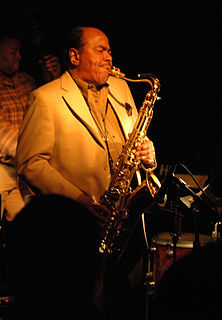
Benny Golson is an American bebop/hard bop jazz tenor saxophonist, composer, and arranger. He came to prominence with the big bands of Lionel Hampton and Dizzy Gillespie, more as a writer than a performer, before launching his solo career. Golson is known for co-founding and co-leading The Jazztet with trumpeter Art Farmer in 1959. From the late 1960s through the 1970s Golson was in demand as an arranger for film and television and thus was less active as a performer, but he and Farmer re-formed the Jazztet in 1982.
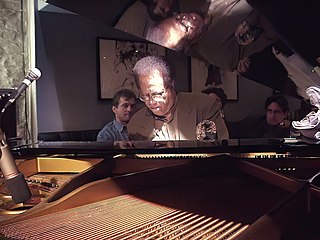
Cedar Anthony Walton, Jr. was an American hard bop jazz pianist. He came to prominence as a member of drummer Art Blakey's band, The Jazz Messengers, before establishing a long career as a bandleader and composer. Several of his compositions have become jazz standards, including "Mosaic", "Bolivia", "Holy Land", "Mode for Joe" and "Fantasy in D".

Arthur Stewart Farmer was an American jazz trumpeter and flugelhorn player. He also played flumpet, a trumpet–flugelhorn combination especially designed for him. He and his identical twin brother, double bassist Addison Farmer, started playing professionally while in high school. Art gained greater attention after the release of a recording of his composition "Farmer's Market" in 1952. He subsequently moved from Los Angeles to New York, where he performed and recorded with musicians such as Horace Silver, Sonny Rollins, and Gigi Gryce and became known principally as a bebop player.

Albert "Tootie" Heath is an American jazz hard bop drummer, the brother of tenor saxophonist Jimmy Heath and the double-bassist Percy Heath.
"I Remember Clifford" is an instrumental jazz threnody written by jazz tenor saxophonist Benny Golson in memory of Clifford Brown, the influential and highly regarded jazz trumpeter who died in an auto accident at the age of 25. Brown and Golson had done a stint in Lionel Hampton's band together. The original recording was by Donald Byrd in January 1957.
Ronnie Stephenson was an English jazz drummer. He was one of the most in-demand drummers on the British jazz scene in the 1960s.
Addison Gerald Farmer was an American jazz bassist. He was the twin brother of Art Farmer.

Thomas S. McIntosh was an American jazz trombonist, composer, arranger, and conductor.
Mickey Tucker is an American jazz pianist and organist.

Meet the Jazztet is an album by the Jazztet, led by trumpeter Art Farmer and saxophonist Benny Golson featuring performances recorded in 1960 and originally released on the Argo label.
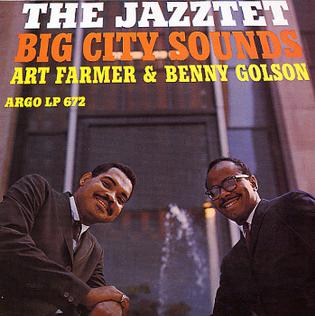
Big City Sounds is an album by The Jazztet, led by trumpeter Art Farmer and saxophonist Benny Golson, featuring performances recorded in 1960 and originally released on the Argo label.

The Jazztet and John Lewis is an album by the Jazztet, led by trumpeter Art Farmer and saxophonist Benny Golson and featuring performances composed and arranged by John Lewis. It was recorded in late 1960 and early 1961 and originally released on the Argo label.
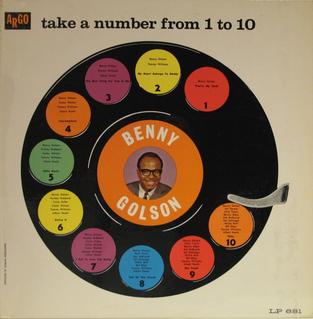
Take a Number from 1 to 10 is an album by saxophonist Benny Golson, featuring performances recorded in late 1960 and early 1961 and originally released on the Argo label.

The Jazztet at Birdhouse is a live album by the Jazztet, led by trumpeter Art Farmer and saxophonist Benny Golson. It features performances recorded in Chicago in 1961 and was originally released on the Argo label.

Art is an album by trumpeter Art Farmer, featuring performances recorded in 1960 and originally released on the Argo label. Farmer stated in 1995 that the album, which consists mainly of ballads, was his favorite.
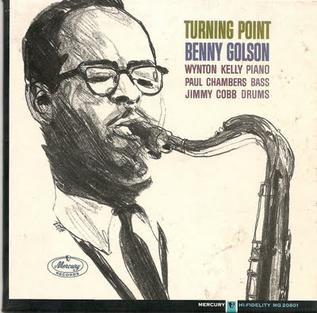
Turning Point is an album by saxophonist Benny Golson, featuring performances recorded in late 1962 and originally released on the Mercury label.

Free is an album by saxophonist Benny Golson recorded in late 1962 and originally released on the Argo label.
The Jazztet was a jazz sextet, co-founded in 1959 by trumpeter Art Farmer and tenor saxophonist Benny Golson, always featuring the founders along with a trombonist and a piano-bass-drums rhythm section. In its first phase, the Jazztet lasted until 1962, and helped to launch the careers of pianist McCoy Tyner and trombonist Grachan Moncur III. Farmer and Golson revived the group in 1982 and it again toured extensively. Each generation of the group recorded six albums, which were released on a variety of labels.
"Whisper Not" is a composition by Benny Golson. It is in a minor key and contains a shout chorus. Golson's account of writing the piece is that "I wrote it in Boston at George Wein's Storyville club when I was with Dizzy Gillespie's big band. I wrote that tune in 20 minutes." Some sources indicate that the first recording was by Gillespie, while others indicate that trumpeter Lee Morgan was first.

Voices All is an album by Art Farmer and Benny Golson's group, The Jazztet recorded in Tokyo in 1983 and originally released on the Japanese Eastworld label.
References
- ↑ Bruguiere, Ron (2011) "Collision: When Reality and Illusion Collide". p. 35. Author House.
- ↑ Wilson, John S. (November 28, 1963) "Concert Is Given by Basie and Getz". The New York Times. p. 92.
- 1 2 3 4 Blumenthal, Bob (2004) In The Complete Argo/Mercury Art Farmer/Benny Golson/Jazztet Sessions [CD liner notes]. p. 5. Mosaic.
- 1 2 Matthews, Paul B. (1995) "Ronnie Matthews". Cadence, 21, p. 21.
- ↑ Berrett, Joshua, and Bourgois III, Louis G. "The Musical World of J.J. Johnson". p. 382. Scarecrow Press.
- ↑ Wilson, Michael (April 24, 2007) "Seeking Landmark Status, and Hoping to Lose a Label of Unrest". The New York Times.